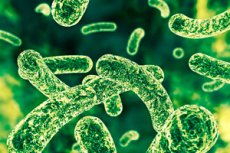New publications
Gut bacteria enhance the effects of cancer immunotherapy
Last reviewed: 02.07.2025

All iLive content is medically reviewed or fact checked to ensure as much factual accuracy as possible.
We have strict sourcing guidelines and only link to reputable media sites, academic research institutions and, whenever possible, medically peer reviewed studies. Note that the numbers in parentheses ([1], [2], etc.) are clickable links to these studies.
If you feel that any of our content is inaccurate, out-of-date, or otherwise questionable, please select it and press Ctrl + Enter.

About one in five cancer patients benefits from immunotherapy, a treatment that uses the immune system to fight cancer. The approach has shown significant success in treating lung cancer and melanoma. In hopes of its potential, researchers are exploring strategies to improve immunotherapy for cancers that don’t respond well to it, with the goal of helping more patients.
Now, researchers at Washington University School of Medicine in St. Louis have found that a strain of gut bacteria, Ruminococcus gnavus, can enhance the effects of cancer immunotherapy in mice. The study, published in the journal Science Immunology, offers a new strategy for using gut microbes to unlock the untapped potential of immunotherapy to fight cancer.
"The microbiome plays an important role in mobilizing the body's immune system to attack cancer cells," explained senior study author Marco Colonna, MD, the Robert Rock Bellivu Professor of Pathology.
"Our findings shed light on a single type of gut bacteria that helps an immunotherapy drug kill tumors in mice. Identifying these microbial partners is an important step in developing probiotics that could improve the effectiveness of immunotherapy drugs and benefit more cancer patients."
Cancer immunotherapy uses the body’s immune cells to target and destroy tumors. One such treatment uses immune checkpoint inhibitors to remove the natural brakes that keep immune T cells quiet, preventing damage to the body. However, some tumors counter this by suppressing the attacking immune cells, making these inhibitors less effective.
Colonna and first co-author Martina Molgor, PhD, previously established a collaboration with colleague Robert D. Schreiber, PhD, in which they completely eradicated sarcomas in mice using a two-pronged inhibition approach.
The researchers inhibited TREM2, a protein produced by tumor macrophages, to prevent T cells from attacking the growing tumor. They then showed that the immunotherapy drug was more effective when TREM2 was blocked. The result indicated that TREM2 reduced the effectiveness of the immunotherapy.
In the experiment that formed the basis for the new study, the scientists made a surprising observation. Mice without TREM2 showed a similar positive response to the checkpoint inhibitor when they were housed with mice that had the protein. This result occurred when the researchers deviated from their usual protocol of separating the mice before treating them with the inhibitor.
Living together in mice results in an exchange of microbes. The researchers speculated that the effects may be due to an exchange of gut bacteria.
The researchers worked with Jeffrey I. Gordon, MD, PhD, and first co-author Blanda Di Lucia, PhD, to study the microbes in the guts of mice successfully treated with immunotherapy. They found an increase in Ruminococcus gnavus compared to the absence of such microbes in mice that did not respond to the therapy.
R. gnavus has been found in the gut microbiome of cancer patients who respond well to immunotherapy, Colonna explained. In clinical trials, fecal transplants from such patients helped some non-responders benefit from immunotherapy.
The researchers, including first co-author and graduate student Daria Khantakova, injected R. gnavus into mice and then treated the tumors with a checkpoint inhibitor. The tumors shrank even when TREM2 was available as a weapon to reduce the effects of the immunotherapy.
Gordon, director of the Edison Family Center for Genome Sciences and Systems Biology, noted that growing evidence suggests that the microbiome enhances immunotherapy. Identifying relevant species, such as R. gnavus, could lead to the development of next-generation probiotics that could work synergistically with immunotherapy to improve cancer treatment.
The scientists now aim to understand how R. gnavus promotes tumor rejection, which could reveal new ways to help cancer patients. For example, if the microbe produces an immune-activating metabolite during the digestion process, this could open the possibility of using the metabolites as immunotherapy boosters.
Microbes can also enter from the gut and trigger an immune response in tumors or activate intestinal T cells, which then migrate to the tumor and launch an attack, Colonna said. Researchers are exploring all three possibilities.
